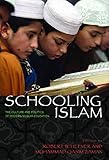Schooling Islam : The Culture and Politics of Modern Muslim Education.
Material type: TextSeries: Princeton Studies in Muslim Politics SerPublisher: Princeton : Princeton University Press, 2007Copyright date: ©2007Description: 1 online resource (291 pages)Content type: text Media type: computer Carrier type: online resourceISBN: 9781400837458Subject(s): Comparative education | Islam and politics | Islamic religious education | Madrasahs | Religion and culture | Religion and politicsGenre/Form: Electronic books.Additional physical formats: Print version:: Schooling Islam : The Culture and Politics of Modern Muslim EducationDDC classification: 297.77 LOC classification: BP44 -- .S38 2007ebOnline resources: Click to View
TextSeries: Princeton Studies in Muslim Politics SerPublisher: Princeton : Princeton University Press, 2007Copyright date: ©2007Description: 1 online resource (291 pages)Content type: text Media type: computer Carrier type: online resourceISBN: 9781400837458Subject(s): Comparative education | Islam and politics | Islamic religious education | Madrasahs | Religion and culture | Religion and politicsGenre/Form: Electronic books.Additional physical formats: Print version:: Schooling Islam : The Culture and Politics of Modern Muslim EducationDDC classification: 297.77 LOC classification: BP44 -- .S38 2007ebOnline resources: Click to View Cover -- Contents -- Acknowledgments -- A Note on Transliteration and Spelling -- Contributors -- CHAPTER 1 Introduction: The Culture, Politics, and Future of Muslim Education -- CHAPTER 2 Madrasas Medieval and Modern: Politics, Education, and the Problem of Muslim Identity -- CHAPTER 3 Tradition and Authority in Deobandi Madrasas of South Asia -- CHAPTER 4 Madrasas and Minorities in Secular India -- CHAPTER 5 The "Recentering" of Religious Knowledge and Discourse: The Case of al-Azhar in Twentieth-Century Egypt -- CHAPTER 6 Madrasas in Morocco: Their Vanishing Public Role -- CHAPTER 7 Islam and Education in Secular Turkey: State Policies and the Emergence of the Fethullah Gülen Group -- CHAPTER 8 Pesantren and Madrasa: Muslim Schools and National Ideals in Indonesia -- CHAPTER 9 The Transformation of Muslim Schooling in Mali: The Madrasa as an Institution of Social and Religious Mediation -- CHAPTER 10 Islamic Education in Britain: Approaches to Religious Knowledge in a Pluralistic Society -- CHAPTER 11 Epilogue: Competing Conceptions of Religious Education -- Index -- A -- B -- C -- D -- E -- F -- G -- H -- I -- J -- K -- L -- M -- N -- O -- P -- Q -- R -- S -- T -- U -- V -- W -- Y -- Z.
Since the Taliban seized Kabul in 1996, the public has grappled with the relationship between Islamic education and radical Islam. Media reports tend to paint madrasas--religious schools dedicated to Islamic learning--as medieval institutions opposed to all that is Western and as breeding grounds for terrorists. Others have claimed that without reforms, Islam and the West are doomed to a clash of civilizations. Robert Hefner and Muhammad Qasim Zaman bring together eleven internationally renowned scholars to examine the varieties of modern Muslim education and their implications for national and global politics. The contributors provide new insights into Muslim culture and politics in countries as different as Morocco, Egypt, Pakistan, India, Indonesia, Iran, and Saudi Arabia. They demonstrate that Islamic education is neither timelessly traditional nor medieval, but rather complex, evolving, and diverse in its institutions and practices. They reveal that a struggle for hearts and minds in Muslim lands started long before the Western media discovered madrasas, and that Islamic schools remain on its front line. Schooling Islam is the most comprehensive work available in any language on madrasas and Islamic education.
Description based on publisher supplied metadata and other sources.
Electronic reproduction. Ann Arbor, Michigan : ProQuest Ebook Central, 2018. Available via World Wide Web. Access may be limited to ProQuest Ebook Central affiliated libraries.

There are no comments on this title.